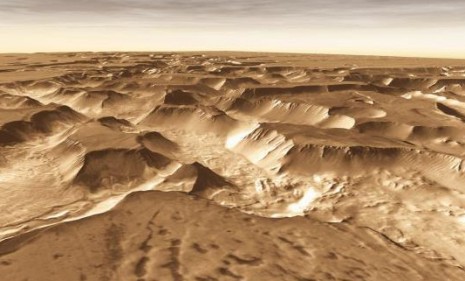Why humans will never colonize space
Our dream of life beyond the stars may be thwarted by fertility-sapping cosmic rays, says a NASA biophysicist

A free daily email with the biggest news stories of the day – and the best features from TheWeek.com
You are now subscribed
Your newsletter sign-up was successful
Sorry, Stephen Hawking. The astrophysicist's grandiose plan for the human race to leave Earth and colonize the far reaches of space may never come to fruition. Why? Because NASA has discovered that space is "simply not a good place to have sex." Here, a quick guide to our outer-space fertility problem:
Why couldn't humans colonize space?
Because any child conceived and born in space is likely to be born sterile. Scientists at NASA say that the high levels of radiation in space would kill any female fetus' lifetime supply of eggs, while males in the womb would likely become sterile. The child could also suffer "mental and physical defects" from exposure to harmful radiation.
The Week
Escape your echo chamber. Get the facts behind the news, plus analysis from multiple perspectives.

Sign up for The Week's Free Newsletters
From our morning news briefing to a weekly Good News Newsletter, get the best of The Week delivered directly to your inbox.
From our morning news briefing to a weekly Good News Newsletter, get the best of The Week delivered directly to your inbox.
Couldn't spaceships protect against this kind of radiation?
No. These are no ordinary protons, but high-energy proton particles from galactic cosmic rays. We on Earth are kept safe from them by our atmosphere and magnetic field, but astronauts in space remain vulnerable.
Has anyone had sex in space before?
It's not clear, says Jason Mick at Daily Tech. Both NASA and the Russians refuse to reveal if their astronauts had ever attempted "zero-G docking maneuvers" in space. The only couple to have traveled together into space — husband and wife team Jan Davis and Mark Lee — remain tight-lipped about whether or not they "got their stellar groove on."
A free daily email with the biggest news stories of the day – and the best features from TheWeek.com
Would the same issue affect colonists on Mars?
No, says James Walker at Gearfuse. The atmosphere of Mars would likely give some protection against these rays. All of which suggests that the problem is "more of an issue for colonization outside of the solar system." Just so long as the astronauts "practice self-restraint while hurtling toward the Red Planet," the human race might be able to procreate away from Earth after all.
Sources: The Independent, Gearfuse, Daily Tech
-
 Political cartoons for February 16
Political cartoons for February 16Cartoons Monday’s political cartoons include President's Day, a valentine from the Epstein files, and more
-
 Regent Hong Kong: a tranquil haven with a prime waterfront spot
Regent Hong Kong: a tranquil haven with a prime waterfront spotThe Week Recommends The trendy hotel recently underwent an extensive two-year revamp
-
 The problem with diagnosing profound autism
The problem with diagnosing profound autismThe Explainer Experts are reconsidering the idea of autism as a spectrum, which could impact diagnoses and policy making for the condition